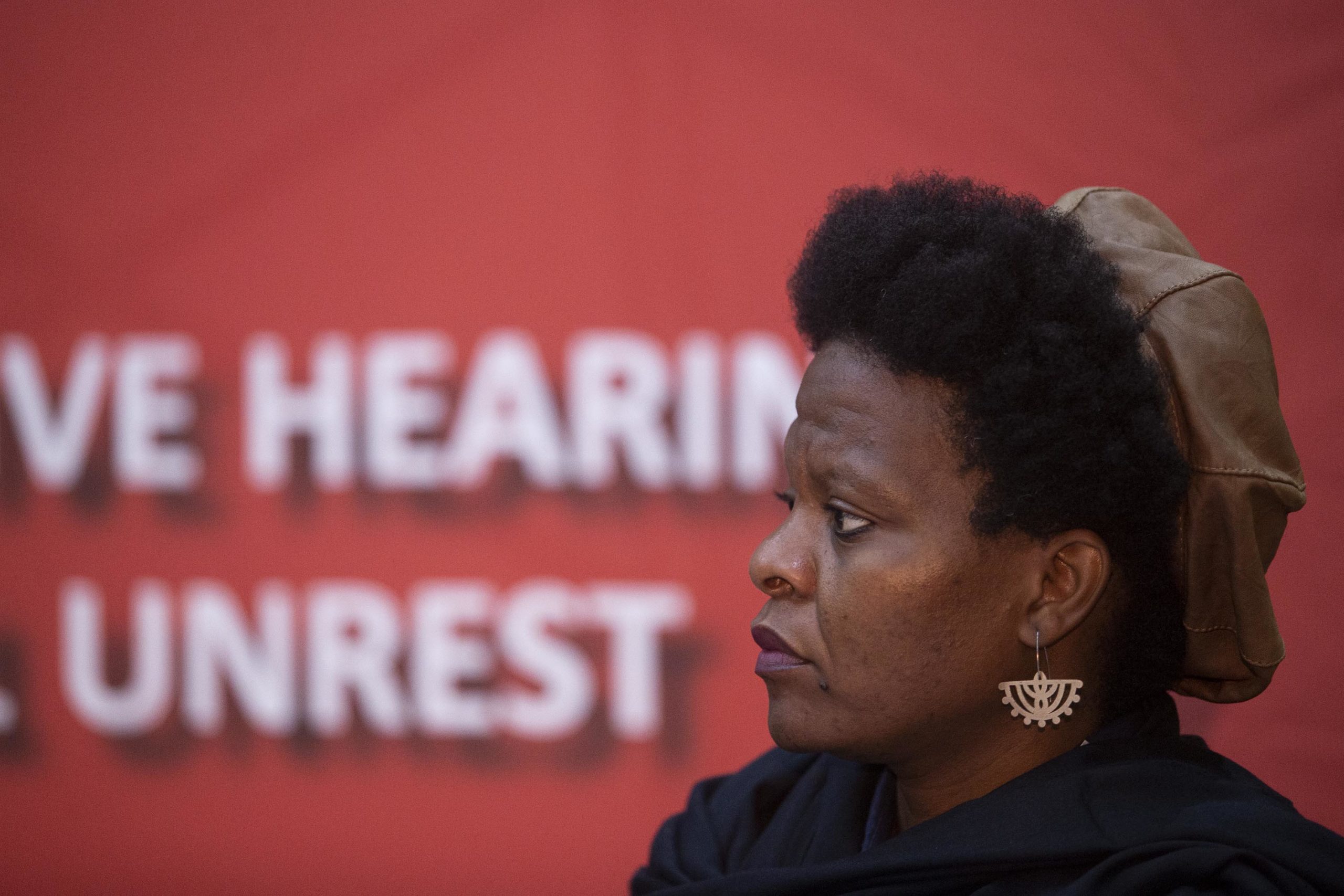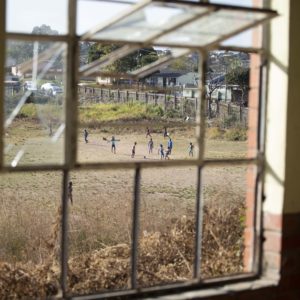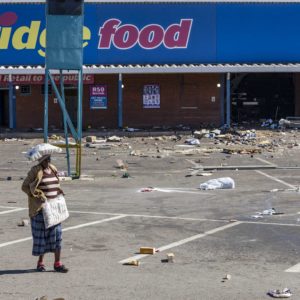Seeking justice, Phoenix violence victims testify
Witnesses to the attacks carried out by so-called neighbourhood watch groups in the north of Durban during the July riots have told the human rights commission the bloodshed was racially motivated.
Author:
19 November 2021

The first week of testimonies at hearings held by the South African Human Rights Commission (SAHRC) into the July riots uncovered the devastation caused by vigilante groups that killed 36 people in Phoenix, north of Durban.
Eyewitnesses described harrowing details of what took place between 12 and 15 July. Their testimonies highlighted the fragmented relationship between residents in Phoenix and the surrounding townships Bhambayi, Ntuzuma, Inanda, Amaoti, Zwelisha and KwaMashu.
The SAHRC is investigating the seemingly racially motivated killings as well as the apparent lapses in law enforcement, particularly by the South African Police Service (SAPS). It is also looking at the role of private security companies in the riots.
Related article:
As each witness took the stand, traces of unresolved racial and social fragmentation made the testimonies tense. The experiences of survivors, as well as the emotional impact on their families, finances, physical and mental states, were put before the public. Some witnesses identified officials in the police and emergency departments who did not do their jobs.
During the week-long riots, at least 342 people were killed across Gauteng and KwaZulu-Natal, the majority of them African.
Witnesses of the Phoenix violence questioned the lack of policing, and wondered how both organised and spontaneous vigilantism spiralled into three days and nights of terror for African people.
No longer safe at home
Witnesses testified to being shot at, assaulted and called racist names. Ntombikayise Lutuka, a Phoenix resident for 16 years who attended one of the hearings, says she is still traumatised by the groups that formed “community watches” on Steinbrook Road in her neighbourhood.
“I will never forget that day. My neighbours turned into wild animals,” she says. Lutuka went outside at about 10am on 12 July to see what was going on. Her son had just returned home shaken after seeing drivers attacked and their cars set alight. Suddenly the atmosphere outside changed, and Lutuka heard her Indian neighbour call out to others. They emerged with weapons. She asked what was going on and he said they were going to protect their homes, but they were walking away from them. Crowds gathered on each corner of the neighbourhood. Lutuka confronted the men. “I screamed asking what was going on and the one neighbour who I initially saw asked me whether I was not afraid to die. I asked who was going to kill me and he … laughed.”
She was relieved when she saw a police van, expecting the officers to disperse the crowd. Instead, she was told to go inside. But she stayed put, wanting to see what her neighbours did with their weapons and gathered rocks.
The first victim Lutuka saw the group attack was a young man who seemed to be returning from work. “He was coming towards the group, hiding his face with his hand. His hand was already missing a few fingers and dripping in blood. They stopped him and asked him what he was doing in Phoenix and began beating him up.”

She screamed and pleaded with the group to let the man go, and they finally did. Then they stopped a car, saying no one goes in or out. Lutuka recognised the driver as a woman who had lived in the neighbourhood for years. The group forced her out of the car, searched it then told her to go home.
Lutuka says she feels betrayed by her neighbours. Since the events in mid-July she no longer feels wanted or safe in the area. Her neighbours have become especially hostile because she has been vocal and present at the court cases of the alleged perpetrators.
“My neighbours are not even pretending to like me anymore … They no longer recognise me as a person. They don’t talk to me and they don’t smile at me.” Lutuka is afraid she made a mistake moving to the neighbourhood in the first place and worries her family will be attacked.
“We can’t trust our neighbours. Our neighbours hacked and tortured Black people right in front of us.” She believes what was done in the name of safety was rooted in a deep hatred for African people. “Amandiya awasifuni [Indians hate us]. They proved it, killing and hacking people like they were animals and in the end they were hailed and called heroes by their party, DA.”
‘My life is over’
Testifying on day two of the hearings, Thulani Mseleku from Phoenix detailed his escape on the night of 12 July. He was on his way home from work when four groups on the highway stopped him and asked where he was coming from. One of the groups grabbed his sunglasses, keys, cellphone and a R200 note inside the car. Others attacked his vehicle, hitting the front and back windscreens with axes and bricks. The final group, comprising about 100 people, attacked him near the Phoenix police station. A brick was thrown through the smashed front windscreen, hitting him in the face. He managed to make it to the police station.
There he found about 15 officers but was asked to stay outside. No one responded when he asked why they were not helping the people being hurt near the station. “I stayed … on the pavement in a pool of my own blood. After about two hours two Black policemen came in and they were told to assist me.” Mseleku was taken to the clinic but was not helped there either. “There were plenty of others on the floor, some hacked and maybe some shot, just lying on the clinic floor.”
Mseleku finally got medical attention on his third day at Mount Edgecombe Hospital where he stayed for a week. His car was a write-off. The left side of his face is permanently scarred.
“My life is over. I have only 14 months before my retirement and I have nothing. My entire left side does not work properly and I am unable to walk long distances and need help to get onto a taxi … The car I lost was to help with transporting my young child who suffers from Down Syndrome to the clinic. Now we are back to square one,” says Mseleku.
Related article:
Testifying on the third day, Ntethelelo Mkhize from Ntuzuma, shared graphic pictures of the injuries to his stomach. Mkhize, a lecturer at a TVET college, says he and a group of eight friends were stopped about five times by groups of 20 or so men and teenagers at Palm View Road in Phoenix around 3pm on 12 July. Some let them pass while others hurled insults such as “monkeys” and “Zuma’s people”.
The fifth group wanted to search the car. One of Mkhize’s friends had a verbal altercation with the leader of the group, asking why his car was being searched. A young man hit the back of it with an axe. Two of Mkhize’s friends got out and then the assault began. Some of his friends were axed, beaten and shot while others escaped into nearby bushes. Mkhize tried to escape but was shot four times in the stomach and back by two different groups. Eventually he abandoned his vehicle and crawled to a nearby house where he collapsed. He woke up hours later at the Unit 10 Clinic in Phoenix.
At the hearing, Sham Maharaj from the Phoenix Ubuntu Forum described the road blocks as urgent responses to the panic spread through social media claiming that homes were next to be looted.
But Mkhize strongly disagrees that the response was necessary or balanced. “Every Indian was violent that day. There was no humanity … There was nobody there to help Black people who were brutally killed. It was like a movie. The whole world should see the videos of what they were doing to us, with the tyres, axes, stones and baseball bats. We are tired of seeing only the videos and pictures of Black people looting food. It’s not a fair representation of what happened and the media needs to show this,” Mkhize says.
Related article:
Maharaj represents a coalition of nongovernmental organisations and residents of Phoenix formed as a direct response to the riots. He says the neighbourhood watch groups were established on 12 July following an alleged looting incident at the South Bay Shopping Centre. He admits he took part in one of the neighbourhood watch groups made up of about 50 men from the area.
Maharaj condemns the killings but refuses to acknowledge that what took place was a massacre.
He also says private security companies, “drug lords and shebeen owners” set up the roadblocks at about five entrances to the community. He insists they were the ones responsible for the killings in Phoenix.
Police minister Bheki Cele reported on 3 August that 22 suspects in the Phoenix killings had been arrested and charged with either murder, attempted murder, damage to property or defeating the ends of justice. The SAPS and the Private Security Industry Regulatory Authority also seized 152 firearms from four private security companies and 112 illegal firearms during a police raid in Phoenix.
The commission will be accepting written submissions from parties affected by the July riots until 3 December. Submissions can be emailed to hearings@sahrc.org.za.



